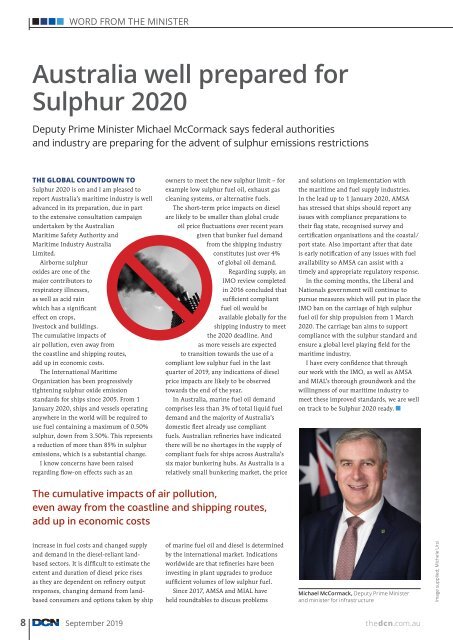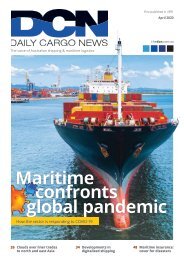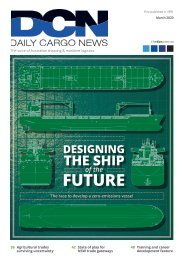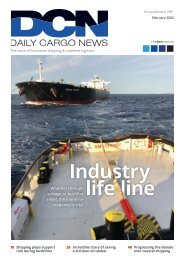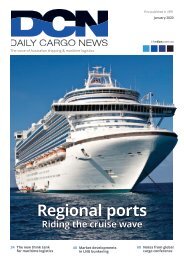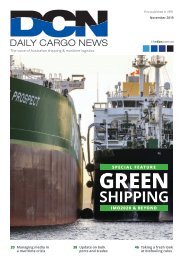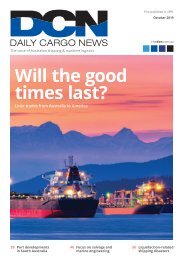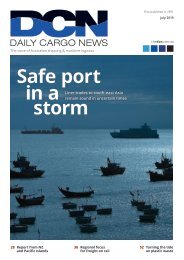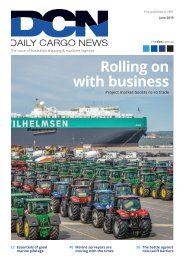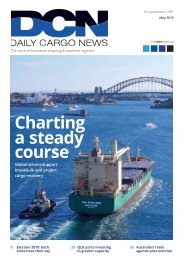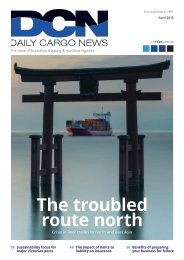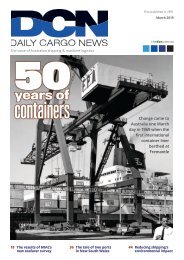DCN September Edition 2019
You also want an ePaper? Increase the reach of your titles
YUMPU automatically turns print PDFs into web optimized ePapers that Google loves.
WORD FROM THE MINISTER<br />
Australia well prepared for<br />
Sulphur 2020<br />
Deputy Prime Minister Michael McCormack says federal authorities<br />
and industry are preparing for the advent of sulphur emissions restrictions<br />
THE GLOBAL COUNTDOWN TO<br />
Sulphur 2020 is on and I am pleased to<br />
report Australia’s maritime industry is well<br />
advanced in its preparation, due in part<br />
to the extensive consultation campaign<br />
undertaken by the Australian<br />
Maritime Safety Authority and<br />
Maritime Industry Australia<br />
Limited.<br />
Airborne sulphur<br />
oxides are one of the<br />
major contributors to<br />
respiratory illnesses,<br />
as well as acid rain<br />
which has a significant<br />
effect on crops,<br />
livestock and buildings.<br />
The cumulative impacts of<br />
air pollution, even away from<br />
the coastline and shipping routes,<br />
add up in economic costs.<br />
The International Maritime<br />
Organization has been progressively<br />
tightening sulphur oxide emission<br />
standards for ships since 2005. From 1<br />
January 2020, ships and vessels operating<br />
anywhere in the world will be required to<br />
use fuel containing a maximum of 0.50%<br />
sulphur, down from 3.50%. This represents<br />
a reduction of more than 85% in sulphur<br />
emissions, which is a substantial change.<br />
I know concerns have been raised<br />
regarding flow-on effects such as an<br />
owners to meet the new sulphur limit – for<br />
example low sulphur fuel oil, exhaust gas<br />
cleaning systems, or alternative fuels.<br />
The short-term price impacts on diesel<br />
are likely to be smaller than global crude<br />
oil price fluctuations over recent years<br />
given that bunker fuel demand<br />
from the shipping industry<br />
constitutes just over 4%<br />
of global oil demand.<br />
Regarding supply, an<br />
IMO review completed<br />
in 2016 concluded that<br />
sufficient compliant<br />
fuel oil would be<br />
available globally for the<br />
shipping industry to meet<br />
the 2020 deadline. And<br />
as more vessels are expected<br />
to transition towards the use of a<br />
compliant low sulphur fuel in the last<br />
quarter of <strong>2019</strong>, any indications of diesel<br />
price impacts are likely to be observed<br />
towards the end of the year.<br />
In Australia, marine fuel oil demand<br />
comprises less than 3% of total liquid fuel<br />
demand and the majority of Australia’s<br />
domestic fleet already use compliant<br />
fuels. Australian refineries have indicated<br />
there will be no shortages in the supply of<br />
compliant fuels for ships across Australia’s<br />
six major bunkering hubs. As Australia is a<br />
relatively small bunkering market, the price<br />
and solutions on implementation with<br />
the maritime and fuel supply industries.<br />
In the lead up to 1 January 2020, AMSA<br />
has stressed that ships should report any<br />
issues with compliance preparations to<br />
their flag state, recognised survey and<br />
certification organisations and the coastal/<br />
port state. Also important after that date<br />
is early notification of any issues with fuel<br />
availability so AMSA can assist with a<br />
timely and appropriate regulatory response.<br />
In the coming months, the Liberal and<br />
Nationals government will continue to<br />
pursue measures which will put in place the<br />
IMO ban on the carriage of high sulphur<br />
fuel oil for ship propulsion from 1 March<br />
2020. The carriage ban aims to support<br />
compliance with the sulphur standard and<br />
ensure a global level playing field for the<br />
maritime industry.<br />
I have every confidence that through<br />
our work with the IMO, as well as AMSA<br />
and MIAL’s thorough groundwork and the<br />
willingness of our maritime industry to<br />
meet these improved standards, we are well<br />
on track to be Sulphur 2020 ready.<br />
The cumulative impacts of air pollution,<br />
even away from the coastline and shipping routes,<br />
add up in economic costs<br />
increase in fuel costs and changed supply<br />
and demand in the diesel-reliant landbased<br />
sectors. It is difficult to estimate the<br />
extent and duration of diesel price rises<br />
as they are dependent on refinery output<br />
responses, changing demand from landbased<br />
consumers and options taken by ship<br />
of marine fuel oil and diesel is determined<br />
by the international market. Indications<br />
worldwide are that refineries have been<br />
investing in plant upgrades to produce<br />
sufficient volumes of low sulphur fuel.<br />
Since 2017, AMSA and MIAL have<br />
held roundtables to discuss problems<br />
Michael McCormack, Deputy Prime Minister<br />
and minister for infrastructure<br />
Image supplied; Michele Ursi<br />
8 <strong>September</strong> <strong>2019</strong><br />
thedcn.com.au


